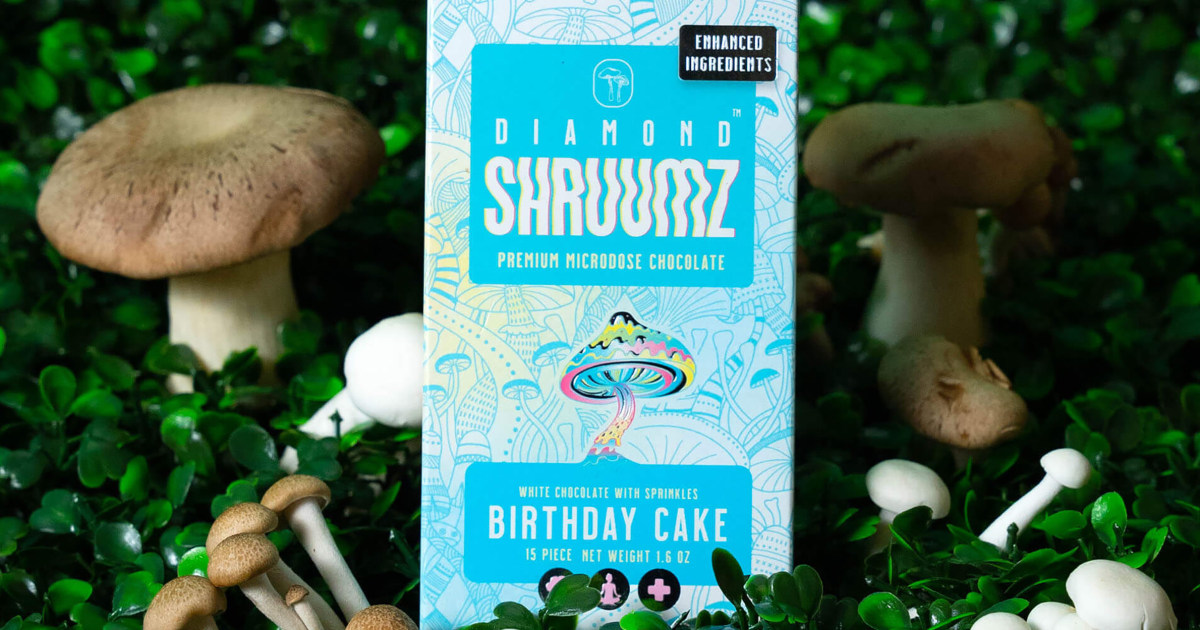The Food and Drug Administration is investigating a death that may be linked to the Diamond Shruumz brand of mushroom-filled chocolates or treats.
According to the agency, as of Monday, 48 illnesses and 27 hospitalizations were linked to the sweets.
Prophet Premium Blends of Santa Ana, Calif., which makes the products, initiated a nationwide recall of Diamond Shruumz brand chocolate bars, cones and gum on Thursday. The recall was announced Friday in a statement published on the FDA’s website.
The FDA, along with the Centers for Disease Control and Prevention, poison control centers and local agencies, have launched an investigation into the illnesses.
People who became ill after eating the mushroom-filled sweets have reported a range of severe symptoms, including seizures, loss of consciousness, confusion, drowsiness, agitation, abnormal heart rhythms, high or low blood pressure, nausea and vomiting, the FDA said. .
Prophet Premium Blends did not immediately offer comment in response to an inquiry.
In a statement on the Diamond Shruumz website, the company said “it is essential that all our consumers refrain from ingesting this product while we, along with the FDA, continue our investigation into what is causing the serious adverse effects.” .
Twenty-four states have reported cases of illness linked to the products, although the scale of the outbreak may be even larger. Poison control centers nationwide have received 82 reports of exposure to the candy so far.
According to Prophet Premium Blends, the recalled products contain muscimol, a chemical found in some mushrooms, that “may be a possible cause of symptoms consistent with those seen in those who became ill.”
The company said it received two complaints on May 27 about consumers who became ill after consuming a whole bar of chocolate. After a review, the company said, it found “higher than normal amounts of muscicol” in the products.
According to research published last month in the American Journal of Preventive Medicine, muscimol can significantly alter mood, perception, cognition and behavior and can be fatal in high enough doses. The chemical depresses the central nervous system, similar to alcohol or benzodiazepines, and its effects can include dizziness, nausea, fatigue, a feeling of weightlessness, visual and auditory hypersensitivity, spatial distortion, unconsciousness of time, and hallucinations.
The review noted that products containing muscimol, such as chewing gum and vape, have become more widely available in recent years. It calls for “a new regulatory approach” to such products.
Customers who bought Diamond Shruumz chocolates or candies should throw them away immediately, officials warned, as the items “may appeal to children and teenagers”.
Retailers were told to stop selling or distributing the products and “keep the product in a secure location until further instructions are given on how to safely return or dispose of the product”.
Diamond Shruumz bills its products as intended for microdosing, although the company’s website states that they contain no psychedelic substances. (Camelos do not appear to contain psilocybin.)
Some toxicology experts have told NBC News that mushrooms listed as ingredients, such as lion’s mane or ashwagandha, do not produce the effects the company claims, such as relaxation or euphoria.
The FDA has not approved muscimol as a food additive and the chemical is largely unregulated. It is not a federally controlled substance.
The CDC warned health care providers last month that products containing psychoactive ingredients are becoming more widely available in the U.S. and are often sold as candy or chocolate. Such products may contain undisclosed or potentially harmful ingredients that are not approved for use in food, the agency said.
CORRECTION (July 2, 2024, 9:55 a.m. ET): An earlier version of this article misstated the origin of the recall. The manufacturer voluntarily recalled the products in a notice published by the FDA; The FDA did not issue the recall.
